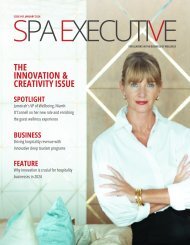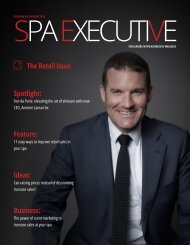Spa Executive Magazine April 2022
Issue #35 of Spa Executive Magazine, The Sustainability Issue, featuring Alena Stavnjak
Issue #35 of Spa Executive Magazine, The Sustainability Issue, featuring Alena Stavnjak
Create successful ePaper yourself
Turn your PDF publications into a flip-book with our unique Google optimized e-Paper software.
ISSUE #35 APRIL <strong>2022</strong><br />
SPA EXECUTIVE<br />
FOR LEADERS IN THE BUSINESS OF WELLNESS<br />
The Sustainability Issue<br />
Alena Stavnjak<br />
1 HOTELS’ ALENA STAVNJAK ON THE<br />
IMPORTANCE OF SUSTAINABILITY<br />
IN HOSPITALITY<br />
NEWS:<br />
Vegan spider silk, coffee,<br />
mushrooms replace single use<br />
plastic packaging<br />
Featured property:<br />
Desa Potato Head Bali<br />
NEWS:<br />
People would take a pay cut to work<br />
for an environmentally responsible<br />
company
PUBLISHER<br />
Roger Sholanki<br />
EDITOR, CREATIVE DIRECTOR<br />
Elizabeth Bromstein<br />
DESIGNER<br />
Design Pickle<br />
AD SALES, CONTRIBUTING EDITOR,<br />
PRODUCTION MANAGER<br />
Sal Capizzi<br />
Note from the Publisher<br />
Dear readers,<br />
“Sustainability” is the word du jour of <strong>2022</strong>. The need to reduce waste is urgent, and everyone knows it.<br />
The sustainability movement was set back for the spa and hospitality industries over the last two years,<br />
taking a backseat to safety and sanitation as we shifted operations to deal with the COVID-19 pandemic.<br />
Waste generation skyrocketed, with the sudden need for bottles of hand sanitizer, disposable wipes,<br />
masks, and gloves, individually wrapped snacks, and whatever else we had to use to keep people safe.<br />
Now that it looks like the pandemic is calming down, we can focus on sustainability again. And, even if it’s not,<br />
and is becoming something we have to live with, we must still start paying attention to other things. Life goes<br />
on, and we can’t make excuses forever.<br />
A company that takes sustainability seriously is 1 Hotels, where sustainability keystones are the foundation<br />
on which the company bases all of its design, construction and operational decisions. These include:<br />
environmental impact; advocacy, education & engagement; human health & wellbeing; resiliency &<br />
ongoing performance improvement; and food & beverage responsibility. In this issue of <strong>Spa</strong> <strong>Executive</strong>, we<br />
spoke to 1 Hotels’ Director of <strong>Spa</strong> & Retail, Alena Stavnjak, the brand’s commitment to sustainability<br />
and why this matters for the industry and the world.<br />
We also feature the Desa Potato Head Bali, a resort that counts sustainability, wellness, and community<br />
among its key pillars. Potato Head takes waste reduction to a new level and just three percent of the waste<br />
it generates winds up in landfills. Impressive? We think so.<br />
More in this month’s issue includes a look at some of the amazing materials being used to create<br />
alternatives to plastic packaging, like vegan spider silk, coffee, seaweed, and mushrooms. And we also talk<br />
about the Noel Asmar Group’s initiative to fund growth of 1,000 trees per month in Ethiopia, and<br />
sustainability as a revenue driver for the hospitality industry.<br />
Eco conscientiousness is a must for businesses now. Those who reject it risk being rejected in turn by<br />
consumers, who want businesses to care about the planet and its people. People want their concerns<br />
addressed, and the spas and hospitality companies that pay attention will come out ahead.<br />
Speaking of sustainability, did you know that Book4Time spa software can create a paperless environment<br />
for your spa? Just thought I’d mention it.<br />
<strong>Spa</strong> <strong>Executive</strong><br />
The online magazine for <strong>Spa</strong><br />
<strong>Executive</strong>s, featuring news<br />
and exclusive interviews.<br />
I hope you enjoy reading this month’s articles in <strong>Spa</strong> <strong>Executive</strong> and that they provide valuable information to<br />
help you achieve success.<br />
Roger Sholanki,<br />
CEO,<br />
Book4Time
Contents<br />
<strong>April</strong> <strong>2022</strong> Volume 35<br />
4<br />
NEWS:<br />
Vegan spider silk, coffee,<br />
mushrooms replace single use<br />
plastic packaging<br />
3<br />
7<br />
BUSINESS:<br />
Doing good is the new revenue<br />
driver for spas and hotels<br />
10<br />
FEATURED PROPERTY:<br />
Desa Potato Head Bali<br />
14<br />
STAFFING:<br />
People would take a pay cut to<br />
work for an environmentally<br />
responsible company<br />
15<br />
16<br />
20<br />
SPOTLIGHT:<br />
1 Hotels’ Alena Stavnjak on the<br />
importance of sustainability in<br />
hospitality<br />
NEWS:<br />
Noel Asmar Group to fund<br />
growth of 1,000 trees per<br />
month in Ethiopia<br />
21<br />
FEATURES:<br />
Partner profile: Q&A with<br />
Tomoka Nguyen of So.Wa<br />
Consultancy<br />
8
News<br />
Vegan spider<br />
silk, coffee,<br />
mushrooms<br />
replace single<br />
use plastic<br />
packaging<br />
Xampla is introducing a range of packaging products made from vegan spider silk.<br />
A variety of materials are being developed to<br />
replace plastics in sustainable packaging including<br />
vegan spider silk.<br />
Plastic is problematic, particularly single-use<br />
plastics. Their production creates pollutants, they<br />
take hundreds of years to break down, a very small<br />
portion of the plastic produced around the world<br />
is actually recycled, and they make up 70% of all<br />
marine trash.<br />
So, many companies have been moving away from<br />
single use plastics – or any plastics at all – towards<br />
a variety of packaging options for retail spa<br />
products and food and beverage.<br />
The best-known alternative to plastic is paper,<br />
which many (most?) people believe is greener, but<br />
which others argue actually isn’t much better for a<br />
variety of reasons. For example, while paper<br />
biodegrades faster than plastic under ideal<br />
conditions, a landfill (which is where both of these<br />
items will end up if not recycled) is not an ideal<br />
condition, as they are usually too densely packed<br />
for biodegradation to occur. Paper is also said to<br />
take significantly more energy to manufacture<br />
than plastic and create much more air and water<br />
pollution than plastic. Plus, paper comes from<br />
trees, which are a finite resource.<br />
Bamboo grows abundantly but its use<br />
may displace wildlife<br />
Paper isn’t the only alternative that some say<br />
creates new problems even while solving others.<br />
One of the fastest growing plants on Earth,<br />
bamboo has become popular for use in<br />
household and personal care products and<br />
packaging. Touted as an eco-friendly alternative to<br />
plastic, metal, and paper, bamboo packaging is a<br />
durable and renewable option that breaks down<br />
within two to six months. Bamboo requires no<br />
pesticides or irrigation in its cultivation, releases<br />
35% more oxygen into the atmosphere than trees,<br />
and has a greater tensile strength than steel.<br />
Unfortunately, however, due to bamboo’s<br />
increasing popularity, large areas of land are being<br />
cleared to be planted with it and this leads to the<br />
displacement of wildlife, including vulnerable<br />
wildlife like pandas, and a decrease in the<br />
biodiversity of existing ecosystems. Furthermore,<br />
according to Eco & Beyond, the only commercial<br />
scale production of bamboo currently takes place<br />
in China, and the distance a product has to travel<br />
for sale in other places around the world creates a<br />
carbon footprint that can somewhat negate its<br />
green credentials. Nothing is perfect.<br />
04 | <strong>Spa</strong> <strong>Executive</strong> News
Ecovative pioneered the science of using mycelium to grow fully formed<br />
structures used in products to replace Styrofoam and plastics.<br />
Refillable containers are a great idea<br />
Using refillable containers is another solution,<br />
be they metal or even plastic. Not only is this a<br />
sustainable option, it offers the opportunity for<br />
companies to brand containers for customers<br />
to take home and reuse again and again.<br />
Among the cosmetics companies that have<br />
moved towards refillable containers are Dove,<br />
Chanel, and Khiel’s.<br />
Innovative packaging ideas<br />
Innovative and experimental companies are<br />
also experimenting with new and exciting<br />
materials to replace plastic. Many are in the<br />
fledgling stage, and who knows which, if any,<br />
will catch on in future and eventually become<br />
as ubiquitous as plastic is today.<br />
While we can’t know the answer to that, it<br />
does look like the status quo is undergoing a<br />
shift that will likely be permanent. Something<br />
will replace plastic as we know it today, even if<br />
we don’t yet know what.<br />
Here are four materials that are in various<br />
stages of being developed for use as<br />
eco-friendly packaging alternatives to plastic.<br />
Mushrooms<br />
Mushroom packaging is created from<br />
agricultural residue by mixing mycelia (fungus<br />
sprouts), with seedlings or other residues. The<br />
network of wire-like cells acts as a natural<br />
adhesive and grows without the need for<br />
light, water or chemical additives according to<br />
Sustainability Guide. When desired, growth is<br />
stopped by a drying and heat treatment<br />
process. The result is a fully natural composite<br />
material similar to Styrofoam. Mushroom<br />
packaging consists of 100 percent<br />
biodegradable and renewable material. A<br />
company called Ecovative pioneered the<br />
science of using mycelium to grow fully<br />
formed structures used in products to<br />
replace Styrofoam and plastics.<br />
Mushroom packaging offers an alternative to<br />
disposable plastic packaging common to the<br />
beauty industry.<br />
Vegan spider silk<br />
Researchers at the University of Cambridge<br />
accidentally discovered that plant-based<br />
“vegan spider silk” could replace pollutants<br />
found in everyday packaging materials while<br />
researching something else. As it doesn’t<br />
come from spiders, the synthetic polymer is<br />
not technically spider silk, which is one of the<br />
strongest naturally occurring materials on<br />
Earth, but mimics<br />
its composition.<br />
Popular Mechanics reported that the new<br />
material is similar to plastic, is compostable,<br />
and has the potential for use in various<br />
applications, and that the hope is that it will be<br />
an effective, environmentally friendly<br />
alternative to the harmful microplastics and<br />
single-use plastics found in everyday<br />
products.<br />
The material will be developed commercially by a<br />
University of Cambridge affiliated company<br />
called Xampla, which is introducing a range<br />
05 | <strong>Spa</strong> <strong>Executive</strong> News
Evoware creates seaweed packaging to combat waste and increase<br />
the livelihood of Indonesia’s seaweed farmers.<br />
AirXcoffee partners with local coffee shops in Vietnam to supply<br />
grounds for a coffee bio-composite.<br />
of capsules and sachets, including a high<br />
performance fragrance microcapsule for the<br />
home and personal care industries.<br />
Seaweed<br />
Seaweed packaging is made of a natural<br />
polymer derived from seaweed, an abundant<br />
and readily accessible resource according to<br />
PakFactory, and may take the form of a<br />
flexible membrane or disposable bioplastic<br />
film. It’s biodegradable, dissolvable, and<br />
edible, making it a promising alternative to<br />
plastic packaging for food and cosmetics like<br />
gels, masks, and liquids.<br />
According to a report, naturally occurring<br />
antioxidant properties in seaweed can<br />
minimize lipid oxidation and may thereby<br />
increase the shelf life and nutritional value<br />
of food “as well as reduce free radicals<br />
which might have a carcinogenic, mutagenic<br />
or cytotoxic effect.” Some seaweeds have<br />
also proven to inhibit bacteria growth,<br />
meaning it could possibly be used in<br />
antimicrobial packaging.<br />
Indonesia-based, socially responsible<br />
enterprise Evoware is one company creating<br />
seaweed packaging with missions to create<br />
innovative solutions to combat waste and<br />
carbon emissions, and to increase the<br />
livelihood of Indonesia’s seaweed farmers.<br />
Coffee<br />
The world sends more than six million tons<br />
of coffee grounds to landfills each year,<br />
according to the World Economic Forum,<br />
and the by-products of this waste – tannins,<br />
caffeine, and chlorogenic acid – can be<br />
lethal to every organism on the planet in<br />
high doses.<br />
So, it’s good news that researchers have<br />
identified cellulose nanofibers extracted from<br />
spent coffee grounds as a potential material<br />
for use in biodegradable plastics. Demand for<br />
these nanofibers is increasing worldwide, “as<br />
industries realize their potential as a more<br />
environmentally sound and sustainable way<br />
to produce plastics.” The researchers’ goal<br />
was to establish a sustainable recycling<br />
system for the coffee industry.<br />
Meanwhile, Vietnamese green product<br />
manufacturer AirXcoffee has developed a<br />
bio-composite, recyclable, light material using<br />
locally sourced coffee grounds to replace<br />
single-use plastic and is currently making<br />
coffee cups and personal care products,<br />
among other things.<br />
AirXcoffee partners with local coffee shops in<br />
Vietnam to supply the grounds, which are<br />
dried and then blended with cellulose, starch,<br />
waxes, wood, natural resins and oils.<br />
06 | <strong>Spa</strong> <strong>Executive</strong> News
Doing good is the new<br />
revenue driver for spas and hotels<br />
BY ELIZABETH BROMSTEIN<br />
Research consistently finds that consumers<br />
want companies to care about the planet and<br />
its people and will support this with their<br />
dollars.<br />
Research abounds demonstrating that large<br />
segments of global consumers prefer to buy<br />
from companies offering sustainable<br />
products, and would be willing to pay a<br />
premium for them.<br />
A 2019 Accenture survey of 6,000 consumers<br />
in 11 countries across North America, Europe<br />
and Asia, found that:<br />
83%<br />
believe it’s important or extremely<br />
important for companies to design<br />
products to be reused or recycled.<br />
More than<br />
50%<br />
would pay more for sustainable products<br />
designed to be reused or recycled.<br />
72%<br />
said they were currently buying more<br />
environmentally friendly products than they<br />
were five years earlier.<br />
81%<br />
expected to buy more eco-friendly<br />
products over the next five years.<br />
The pandemic has set the sustainability<br />
movement backwards to some degree. In the<br />
hospitality sector it forced hotels and spas to<br />
push health and sanitation to the forefront<br />
meaning suddenly there was a lot of plastic<br />
and many disposable items to contend with.<br />
Looking back, Amanda Frasier, Forbes Travel<br />
Guide’s <strong>Executive</strong> Vice President of Standards<br />
& Ratings, told <strong>Spa</strong> <strong>Executive</strong>, “Just before the<br />
pandemic hit, a big focus for us was launching<br />
sustainability standards. We paused releasing<br />
them because it wasn’t the right time to start<br />
evaluating people’s performance against<br />
reduction of single use plastics when<br />
everything had to be individually wrapped and<br />
there were millions of masks and miniature<br />
bottles of hand sanitizer in circulation.”<br />
07 | <strong>Spa</strong> <strong>Executive</strong> News
But FTG is now launching those standards<br />
and sustainability is again top of mind.<br />
Sustainable travel matters to consumers<br />
According to an article by FTG’s Jennifer<br />
Kester, a 2021 poll from Virtuoso, a global<br />
network of agencies that specialize in luxury<br />
travel, half of travelers surveyed said it’s<br />
important to choose a hotel, cruise line or<br />
travel company with a strong sustainability<br />
policy, 70% said traveling sustainably<br />
enhances their vacation experience, and 82%<br />
said the pandemic made them want to travel<br />
more sustainably in the future.<br />
That being said, most consumers won’t<br />
choose sustainability at any cost. The<br />
Accenture study found that price and quality<br />
were still top considerations, cited by 89%<br />
and 84% of respondents, respectively.<br />
As the price of eco-friendly production and<br />
packaging comes down, and consumer<br />
awareness grows, people will come to expect<br />
sustainable options and being green will<br />
become a cost of entry into mid- to-high level<br />
hospitality markets. Companies that don’t<br />
follow the flow risk being regarded as out of<br />
touch and tone deaf.<br />
Potato Head Bali, where plastic is contraband<br />
An example of what some might call extreme<br />
sustainability is Potato Head Bali. CNBC<br />
reports that a garbage emergency was<br />
declared in Indonesia in 2017 and Bali’s<br />
beaches were covered in waste. Potato Head<br />
seeks to not only reduce waste output but to<br />
also educate people about the problem.<br />
Also according to CNBC, at the resort,<br />
menus are made of old tires and flip flops,<br />
soap dispensers and tissue boxes are<br />
made from oyster shells, polystyrene foam,<br />
bottle caps, and limestone; candle wax is<br />
made from used cooking oil, and glass<br />
candle holders are made from used wine<br />
bottles. At the entrance of the beach club is<br />
an art installation of 5,000 flip flops<br />
collected from Bali beaches. Single use<br />
plastics are banned. Only three percent of<br />
waste generated by Potato Head ends up in<br />
landfills.<br />
“The consumer today demands authenticity<br />
and they demand sustainable solutions,”<br />
Simon J. Pestridge, chief experience officer of<br />
Potato Head Family told CNBC. “If you’re not<br />
focused on it, we don’t think you’ll be in<br />
business in a few years.”<br />
“The younger generation that have<br />
disposable income for the first time, if you<br />
don’t offer them solutions, why would they<br />
come?” he added. As a bonus, Pestridge<br />
told CNBC that these efforts have actually<br />
resulted in cost savings for the resort.<br />
Social justice to the forefront<br />
It’s not just about sustainability. Research finds<br />
that consumers, particularly younger ones,<br />
want brands to go even further towards<br />
actively demonstrating an interest in protecting<br />
the world and its citizens. Recent research<br />
from the Corporate Social Mind found that<br />
Americans report spending more time learning<br />
about social issues and how companies are<br />
getting involved, and many are taking time to<br />
educate themselves more deeply about the<br />
social issues that interest them.<br />
Sixty-six percent of respondents said that<br />
they visit a company’s website or use an<br />
online search engine to learn about the<br />
company’s support of a social issue on a<br />
somewhat frequent to very frequent basis.<br />
The issues listed in the study included, but<br />
weren’t limited to: racial equity, social justice,<br />
anti-discrimination; immigration/refugee<br />
issues, and environment and climate change.<br />
Good intentions won’t be enough. A 2020 survey<br />
from Sprout Social also found that consumer<br />
loyalty could shift if brands don’t honor their<br />
social justice commitments and promises.<br />
PR News reported that 42% of 1,000<br />
consumers say they would start buying from<br />
competitors if brands don’t stay true to their<br />
word and follow through with action, and<br />
55% said they “expect brands to take a<br />
stance that goes beyond corporate<br />
statements and monetary donations, such as<br />
new corporate initiatives, or commitments to<br />
specific goals.” These expectations increase<br />
to 65% among millennials.<br />
Green Queen reports that a study from<br />
Wunderman Thompson backs this up. A<br />
survey of more than 3,000 respondents<br />
across China, the U.K. and U.S. found that<br />
eight in ten consumers now expect<br />
businesses to help solve global climate and<br />
social justice issues. More than eight in ten<br />
want businesses to “play their part” to solve<br />
the challenges of climate change and social<br />
inequality, 88% think sustainability should be<br />
a standard business practice, and 82% said<br />
businesses should put people and the planet<br />
before their profits.<br />
Furthermore, consumers are making stronger<br />
connections between sustainability and other<br />
socioeconomic issues — 80% believe that<br />
climate and environmental issues are<br />
“inextricably linked” with poverty, inequality, and<br />
social justice.<br />
08 | <strong>Spa</strong> <strong>Executive</strong> News
“Regenerative,” is apparently a term people<br />
are using to refer to brands that go beyond<br />
recycling or becoming carbon neutral and<br />
that are actively working to have a positive<br />
impact on the planet. Green Queen reports<br />
that being “regenerative” will become a major<br />
value that consumers are looking for from<br />
brands. They will also want evidence to back<br />
up claims.<br />
Companies looking to win over younger,<br />
affluent consumers would do well to take<br />
heed. With elder millennials now in their 40s,<br />
Generation Z is moving in, making up an<br />
estimated 20% of the global market and<br />
increasing parts of the travel and wellness<br />
markets. Gen Z consumers are the most<br />
conscious and are at the forefront of driving<br />
demand in sustainable industries.<br />
much as you cut it, so it’s very sustainable<br />
which is important to us. We take pride in our<br />
efforts to support local economies and protect<br />
fragile ecosystems, using earth-friendly<br />
products sourced from within 100 km of each<br />
of our locations. I see this as a way of adding<br />
authenticity to the spa experience while<br />
helping surrounding communities.”<br />
Given the volume of available information<br />
about the global state of affairs, it stands<br />
to reason that consumers will become<br />
more conscious in the coming years, and<br />
those with spending power will want<br />
these concerns addressed.<br />
The spas and luxury hospitality<br />
companies that pay attention will come<br />
out ahead.<br />
What does this mean for spa, wellness, and<br />
hospitality?<br />
We are all probably somewhat informed on<br />
how to be more sustainable in our<br />
businesses with low impact products in<br />
sustainable packaging, eco-friendly cleaner,<br />
energy efficient spaces, and finding more<br />
ways to reduce waste<br />
Beyond that, forward thinking spas are<br />
marrying sustainability with social issues. In a<br />
Spotlight interview with <strong>Spa</strong> <strong>Executive</strong>,<br />
Arabelle del Pilar Rosario, <strong>Spa</strong> & Wellness<br />
Director for Meliá Hotels International in<br />
Dominican Republic, said one of the<br />
company’s spa concepts is “a focus on local<br />
roots using ingredients like coffee, salt, and<br />
chocolate from the Dominican Republic.” She<br />
went on to say, “We use Moringa, which is a<br />
superfood and powerful plant that grows<br />
everywhere in the country. It will grow as<br />
09 | <strong>Spa</strong> <strong>Executive</strong> News
Featured property:<br />
Desa Potato Head Bali<br />
Bali’s Desa Potato Head is a sustainable village<br />
and resort designed to inspire creativity,<br />
balance and progress.<br />
Desa Potato Head is a creative village in Bali,<br />
Indonesia where music, art, design, food, and<br />
wellness play together by the ocean. The<br />
property, set on the sand and surf of<br />
Petitenget Beach, Seminyak, is made-up of<br />
Potato Head Beach Club and Potato Head<br />
Studios – a 168-room hotel designed by David<br />
Gianotten and the OMA team. The property<br />
features a farm-to-table restaurant and<br />
several bars.<br />
“Good times, do good”<br />
Sustainability, wellness, and community<br />
connection are among the key pillars at<br />
Potato Head. Music, art and cultural<br />
programs promote and support<br />
Indonesia’s creative scene, and the resort<br />
offers educational workshops on<br />
sustainability and houses a Sustainism<br />
Lab that gives new life to waste. Potato<br />
Head also helps the local community<br />
access nourishing, naturally produced<br />
food through Sweet Potato Project, a<br />
farming initiative.<br />
More than a place to visit or stay, the Desa<br />
(village) is intended to inspire creativity,<br />
balance and progress.<br />
“We believe every one of our steps should lead<br />
to something positive, so our ethos is simple:<br />
good times, do good,” says a statement.<br />
10 | <strong>Spa</strong> <strong>Executive</strong> Featured Property
At Potato Head, sustainability is serious<br />
business. The hotel is constructed from<br />
recycled materials, including plastic bottles<br />
for the woven ceilings. A natural ventilation<br />
system is based on draft and, at one point,<br />
the whole building was turned three degrees<br />
to reduce the energy load. Green roofs<br />
reduce the temperature of the building by<br />
retaining water.<br />
Everything we throw away comes back to us<br />
As little as possible goes to waste. Candles<br />
are made from used cooking oil and glass<br />
candle holders from used wine bottles,<br />
furniture is made from recycled plastic. Upon<br />
arrival, guests are offered a zero-waste kit, to<br />
reduce the use of single-use plastics and to<br />
start the conversation about design and<br />
waste as a vehicle for change. Plastic water<br />
bottles are confiscated at check in. An<br />
in-house team sorts and separates waste<br />
and supplies vendors with plastic reusable<br />
tubs to collect goods and avoid single-use<br />
plastics. The hotel is carbon neutral and just<br />
three percent of the waste it generates ends<br />
up in landfills.<br />
On the resort grounds is an art installation<br />
created from more than 5,000 flip flops<br />
salvaged from Bali beaches. The piece was<br />
created in collaboration with collaborated<br />
with award-winning German art activist<br />
Liina Klauss to demonstrate the reality of<br />
marine pollution and transmit the message<br />
that “Everything we throw away comes<br />
An art installation created from more than 5,000 flip flops salvaged from Bali beaches.<br />
back to us—via the air we breathe, the<br />
water we drink, and the soil we grow.”<br />
11 | <strong>Spa</strong> <strong>Executive</strong> Featured Property
Supporting local culture and economies<br />
Sanctuary & Sistrum<br />
Beyond that, Desa Potato Head supports<br />
local economies, producers, and artists.<br />
Almost every part of the hotel is handmade<br />
by local artisans, and food and beverage is<br />
locally sourced from small farms and a<br />
sustainable seafood supplier.<br />
Desa Potato Head also recently launched new<br />
wellness offerings. Sanctuary is “an immersive<br />
wellness experience connecting the<br />
community with their flow state by increasing<br />
relaxation and concentration while awakening<br />
a higher level of consciousness.”<br />
The <strong>Spa</strong> at Desa Potato Head<br />
The <strong>Spa</strong> at Desa Potato Head is a place<br />
where modern design meets traditional<br />
healing practices. Guests are invited to relax<br />
in cocoon-like rooms and enjoy a heightened<br />
sensory experience. All spa products are<br />
created in Bali by Sensatia Botanicals using<br />
methods that honor the life force of each<br />
active ingredient. Wellness offerings include<br />
group meditations and yoga.<br />
Stand out spa menu items include the<br />
Traditional Mandi Lulur, an ancient<br />
beauty ritual originating in the royal palaces<br />
of Central Java – “A purifying bath for<br />
princesses, the scrub would soften,<br />
sweeten and lighten” the skin. This<br />
treatment uses a delicate mix of rice<br />
In partnership with the founders of Pyramids<br />
of Chi in Ubud and located in Potato Head<br />
Studios, Sanctuary offers alternative forms of<br />
meditation including vibroacoustic light<br />
therapy, sound healing, breathwork, and ice<br />
bath therapy.<br />
Sistrum is an immersive Light, Sound, and<br />
Vibration experience “for awakening<br />
human potential<br />
.<br />
“The technology augments the sound healing<br />
experience by delivering sound as physical<br />
vibration Inside the body through custom made<br />
waterbeds with built-in vibrational speakers<br />
and synchronized light frequency stimulation<br />
to stimulate brainwave states and closed-eye<br />
visionary experiences.”<br />
powder, white turmeric, ginger, cumin and<br />
crushed dried jasmine flowers, and includes<br />
an Indonesian massage.<br />
Another is the Skin-Renewing Saltscrub, a<br />
salt scrub designed to help shed old skin<br />
cells to reveal new, no return healthier skin.<br />
The salt scrub is infused with essential oils of<br />
nutmeg, bergamot, and lime to nourish as it<br />
exfoliates.<br />
12 | <strong>Spa</strong> <strong>Executive</strong><br />
Featured Property
ARE YOU PASSIONATE ABOUT THE<br />
SPA & WELLNESS INDUSTRY & DO<br />
YOU LOVE TECHNOLOGY?<br />
COME WORK FOR US.<br />
INSPIRING INNOVATION<br />
Book4Time is the global leader in spa, wellness, and leisure activity management software for the hospitality market. Our<br />
SaaS platform manages the end-to-end guest experience and back-office operations for some of the world’s top hotels,<br />
resorts, casinos, and private clubs in more than 85 countries.<br />
Book4Time is experiencing rapid growth and is hiring experienced professionals in a number of key roles including:<br />
Customer<br />
Success<br />
Software<br />
Development<br />
Marketing<br />
Product<br />
Management<br />
Sales<br />
If you thrive on innovation and are you looking for a compelling career<br />
opportunity, view our current openings<br />
@ https://book4time.com/careers/<br />
We look forward to working with you!
People would<br />
take a pay cut to<br />
work for an<br />
environmentally<br />
responsible<br />
company<br />
Focus on sustainability to attract talent to<br />
your spa. Millennials and Gen Z in<br />
particular want to work for<br />
environmentally responsible companies.<br />
If you want to attract talent, particularly<br />
millennial talent, focus on sustainability.<br />
People want to work for companies that<br />
care about the planet and some will even<br />
take a pay cut to do so.<br />
In a 2021 global survey by IBM Institute for<br />
Business Value (IBV), 71% of employees and<br />
job seekers said that environmentally<br />
sustainable companies are “more attractive<br />
employers.” More than two thirds of<br />
respondents also said they are more likely<br />
to apply for and accept jobs with<br />
environmentally and socially responsible<br />
organizations, and nearly half would accept<br />
a lower salary to work for these companies<br />
(via the CSR Journal).<br />
Think carefully about how to attract top talent<br />
this year and beyond<br />
We already know that people are quitting<br />
their jobs, that this trend is expected to<br />
continue throughout <strong>2022</strong>, and that spa<br />
and hospitality are among the hardest hit<br />
sectors by staff shortages. There is good<br />
reason for employers to think carefully<br />
about what they need to do to attract top<br />
talent this year and beyond.<br />
Sustainability is not a trend but a powerful<br />
movement setting industry standards that<br />
is largely driven by millennials and Gen Z.<br />
Companies that fail to up their efforts risk<br />
losing top talent to greener competitors.<br />
Workers would take a pay cut for a green<br />
employer<br />
These findings echo similar ones from<br />
previous research. A 2019 survey of 1,000<br />
employees at large U.S. companies found<br />
that a majority of millennials would prefer<br />
to work for an environmentally responsible<br />
company. More than 10% of respondents<br />
said they’d be willing to take a<br />
$5,000-$10,000 pay cut.<br />
Fast Company reported that more than<br />
70% of respondents said they were more<br />
likely to choose to work for a company with<br />
a strong environmental agenda, and that<br />
millennials were most likely to have already<br />
done so. Nearly 40% said they had chosen<br />
a job in the past because the company was<br />
more eco-conscious than a competitor. By<br />
contrast, less than a quarter of Gen X<br />
respondents and only 17% of baby<br />
boomers said the same.<br />
Separate research conducted in 2016<br />
reportedly found that three quarters of<br />
millennials consider a company’s social and<br />
14 | <strong>Spa</strong> <strong>Executive</strong> News
environmental commitments when deciding<br />
where they want to work, and that nearly two<br />
thirds wouldn’t take a job if a potential<br />
employer didn’t have strong corporate social<br />
responsibility (CSR) practices.<br />
More findings regarding millennials and the<br />
workforce include:<br />
75%<br />
would take a pay cut to work for a<br />
responsible company (vs. 55% U.S.<br />
average).<br />
88%<br />
say their job is more fulfilling when they<br />
are provided with opportunities to make a<br />
positive impact on social and<br />
environmental issues (vs. 74% U.S.<br />
average).<br />
76%<br />
consider a company’s social and<br />
environmental commitments when<br />
deciding where to work (vs. 58% U.S.<br />
average). (via sustainablebrands.com)<br />
Millennials will make up three quarters of the<br />
workforce by 2025 and Gen Z will comprise<br />
30% of the workforce by 2030.<br />
15 | <strong>Spa</strong> <strong>Executive</strong> News
1 Hotels’ Alena Stavnjak<br />
on the importance of sustainability<br />
in hospitality<br />
1 Hotels’ Director of <strong>Spa</strong> & Retail, Alena<br />
Stavnjak, on 1 Hotels’ commitment to<br />
sustainability and why this matters for the<br />
industry and the world.<br />
As a luxury lifestyle hotel brand inspired by<br />
nature, 1 Hotels cultivates the best of<br />
sustainable design and architecture,<br />
together with extraordinary comfort and<br />
an outstanding level of service. 1 Hotels,<br />
which launched in 2015 with the opening<br />
of exclusive properties in Miami’s South<br />
beach and Manhattan’s Central Park,<br />
followed by Brooklyn, West Hollywood,<br />
Sanya (China), and most recently Toronto,<br />
is inspired by a simple idea: those that<br />
travel the world should also care about it,<br />
it is, after all, 1 world.<br />
1 Hotels sanctuaries offer sustainable<br />
retreats, exquisite escapes, and profound<br />
wellness experiences in environments where<br />
architecture echoes natural surroundings<br />
and biophilic design details soften the lines<br />
between interior and exterior.<br />
1 Hotels’ sustainability keystones are the<br />
foundation on which the company bases all<br />
of its design, construction and operational<br />
decisions. These include: environmental<br />
impact; advocacy, education & engagement;<br />
human health & wellbeing; resiliency &<br />
ongoing performance improvement; and<br />
food & beverage responsibility.<br />
The Director of <strong>Spa</strong> and Retail for this<br />
trailblazing brand is Alena Stavnjak, an<br />
industry professional with nearly two<br />
decades of experience and several awards,<br />
including the World’s <strong>Spa</strong> Awards best<br />
Florida Hotel <strong>Spa</strong> in 2019 and 2020.<br />
We spoke with Alena Stavnjak about 1 Hotels’<br />
commitment to sustainability and why this<br />
matters for the industry and the world.<br />
Please tell us about your role at 1 Hotels and<br />
what you do.<br />
I am the Director of <strong>Spa</strong> and Retail for 1<br />
Hotels. I manage 1 Hotel South Beach and<br />
am in charge of execution of new spa<br />
developments for 1 Hotels and Baccarat.<br />
16 | <strong>Spa</strong> <strong>Executive</strong> Spotlight
This year we are opening four new spas: 1<br />
Hotel San Francisco, 1 Hotel Nashville, 1 Hotel<br />
Hanalei Bay, and 1 Hotel West Hollywood. I also<br />
serve as a Sustainability & Wellness Council<br />
member of The Greater Miami and the<br />
Beaches Hotel Association. We help spread the<br />
awareness and adoption of sustainable &<br />
wellness practices by providing guidance,<br />
expertise and resources to association<br />
members. I am also a co-founder of the<br />
Southeast & Northeast <strong>Spa</strong> Wellness<br />
Association, the largest North American<br />
regional spa association.<br />
Can you talk a bit about your career trajectory and<br />
how you came to be where you are today?<br />
I have a hotel management degree. I ended up in<br />
the spa as my first job with the Ritz Carlton,<br />
thinking that I would transition to a different<br />
department six months later, but then I fell in love<br />
with the spa. That was in 2003. I was with Ritz<br />
Carlton for about 10 years at various locations.<br />
Then I was with the Viceroy for about four years,<br />
and I’ve been with 1 Hotels for six years.<br />
When I joined 1 Hotels, I’ll be honest,<br />
sustainability was not a big part of my life. I<br />
told the interviewer that, once I started to<br />
work here, I was sure to adopt a lot of those<br />
practices. And I have. Working for 1 Hotels<br />
has changed me. Sustainability is now very<br />
important to me. It’s the key to a better and<br />
healthier future. It improves the quality of our<br />
lives, protects our ecosystems, and preserves<br />
natural environments for future generations. I<br />
have a seven-year-old son who is already well<br />
educated on sustainability.<br />
Can you talk about 1 Hotels commitment<br />
to sustainability?<br />
Our vision is to create the most sustainable,<br />
beautiful, and inspiring hotel experience.<br />
17| <strong>Spa</strong> <strong>Executive</strong> Spotlight
We are inspired by nature. The 1 Hotels<br />
brand is built on a foundation of keystones<br />
upon which we base all design, construction,<br />
and operational decisions. The interiors<br />
make use of reclaimed woods, bricks, marble,<br />
stone, and locally sourced glass, along with<br />
native natal mahogany trees. Comforts in<br />
each room include a yoga mat, living green<br />
elements, 100% organic cotton Keetsa<br />
mattresses and floor-to-ceiling windows<br />
which provide fresh air, stunning views, and<br />
welcome natural light into each guest room.<br />
We try to give a second life to everything that<br />
we use in our hotels and to be a platform for<br />
change. If the guest that stays with us takes<br />
one thing home with them that they have<br />
seen or experienced that they can apply to<br />
their daily life – maybe it’s just using less<br />
plastic – then we have succeeded.<br />
What has changed and what developments<br />
have there been around sustainability in the<br />
past couple of years?<br />
Sustainability is the new norm. I have also<br />
seen a big sustainability trend in Mexico<br />
and the Caribbean. Resorts are focused on<br />
preserving our natural resources and<br />
with some of my spa director friends, some<br />
are having a challenge with recruiting service<br />
providers, while others have a challenge<br />
finding operational staff.<br />
With the staff crunch, we must be mindful<br />
of not burning out current staff members.<br />
We have to nurture and provide extra TLC.<br />
My hotel is doing a great job in ensuring that<br />
we do monthly employee appreciation<br />
celebrations and monthly General Manager<br />
roundtables where staff can express their<br />
concerns and feedback. In the spa we held a<br />
guided yoga meditation on 2.2.<strong>2022</strong> when<br />
on this special date everyone was setting<br />
their intentions for <strong>2022</strong>. We, as leaders,<br />
must continue to show our gratitude and<br />
recognition to our team members.<br />
What’s your favorite part of your job?<br />
It will sound like a cliché but I truly love<br />
working with people. Ensuring that my staff<br />
is happy and taken care of, and has all the<br />
tools and supplies to perform their job to<br />
the best of their ability is my number one<br />
priority. Once they are happy, that trickles<br />
down to our guests and an overall<br />
successful and profitable spa operation.<br />
helping with overall wellbeing. Their spas<br />
are state-of-the-art with various amenities<br />
and water features, and resorts are<br />
surrounded with a lot of greenery and<br />
environments are created from the natural<br />
habitat.<br />
What is the biggest challenge the<br />
spa/hospitality industry is facing?<br />
Talent management and recruitment. Hotels<br />
and spas are busy with high occupancies and<br />
demanding guests, but there has been a<br />
staff shortage, nationwide. This has been an<br />
ongoing trend in the industry. In speaking<br />
18 | <strong>Spa</strong> <strong>Executive</strong> Spotlight
INSPIRING INNOVATION<br />
Award-winning cloud software for<br />
the spa & wellness industry<br />
HOTELS<br />
& RESORTS<br />
CASINOS BEAUTY DAY SPAS FITNESS &<br />
CLASSES<br />
We keep innovating so your wellness business can keep growing<br />
This integrated payment solution helps you<br />
streamline your organization by managing your<br />
business and payments all in one place.<br />
Easy to use online intake forms give your<br />
customers a high-quality experience from their<br />
phone, tablet or desktop.<br />
An online magazine that focuses on the latest<br />
trends and industry insights aimed at helping all<br />
leaders in the business of wellness.<br />
We want to meet you!<br />
Join us at the <strong>2022</strong> ISPA<br />
Conference & Expo<br />
Dates: May 2-4<br />
Booth: 715<br />
<strong>2022</strong> CONFERENCE<br />
MAY 2-4 | LAS VEGAS, NEVADA
Noel Asmar<br />
Group to fund<br />
growth of 1,000<br />
trees per month<br />
in Ethiopia<br />
Noel Asmar Group partners with WeForest<br />
for sustainability initiative for conserving<br />
and restoring the ecological integrity of<br />
forests and landscapes.<br />
The Noel Asmar Group is once again<br />
demonstrating their commitment to<br />
sustainability in the textile and wellness<br />
space, this time by partnering with WeForest.<br />
WeForest is an organization supporting<br />
projects around the world focusing on<br />
tropical regions highly affected by climate<br />
change. Since its inception, WeForest has<br />
dedicated itself to “conserving and restoring<br />
the ecological integrity of forests and<br />
landscapes.”<br />
The Noel Asmar group comprises three<br />
brands – Asmar Equestrian, Pedicure Bowls,<br />
and Noel Asmar Uniforms – and has a long<br />
history of weaving sustainable initiatives into<br />
business practices.<br />
“We design and create with purpose, intent,<br />
and sustainability in the pursuit of wellness<br />
in every aspect of life” said CEO Noel Asmar<br />
in a statement. “Taking care of our Earth, and<br />
the people who call it home, is at the core of<br />
everything we do. It’s our passion.”<br />
Through the partnership, The Noel Asmar<br />
Group has committed to funding the growth<br />
of 1,000 trees per month as part of a<br />
reforestation project in Ethiopia’s Desa’a<br />
Forest Reserve. Much of the forest has<br />
disappeared or is severely degraded,<br />
according to a media release, and<br />
intervention is crucial to ensure species are<br />
protected, soil erosion is minimized, and<br />
local communities retain their livelihood.<br />
“It’s not just about growing trees” says Asmar,<br />
“It’s tangible changes with a big impact. It’s<br />
purposeful and lifts up communities with an<br />
emphasis on women, youth, and the farmers<br />
so many depend on.”<br />
Noel Asmar Group is well known for an<br />
emphasis on sustainability. The group<br />
launched their first sustainable uniform<br />
collections in 2018 and have committed to<br />
sourcing sustainable fabrics and yarns<br />
wherever possible. They also create<br />
garments from recycled water bottles that<br />
are pelleted and spun into fabric used in<br />
both the equestrian and uniform brands. To<br />
date, the group has diverted over 578,000<br />
water bottles from landfills.<br />
“We work with world-renowned brands like<br />
Sandals, Four Seasons, Ritz Carlton,<br />
LaPrairie, and they value sustainability. Our<br />
customers and clients are making choices<br />
that reflect that and we’re continuing to find<br />
new ways to deliver.”<br />
Many Asmar garments are also certified free<br />
of harmful substances while the cashmere<br />
used by Asmar Equestrian is sustainably<br />
sourced from traceable regions of Mongolia,<br />
and monitored by government to preserve<br />
the landscape.<br />
“We don’t believe in ‘good enough’. We’re<br />
always looking for ways to do better, better<br />
serve our customers and clients, and take<br />
better care of the planet, and each other. It’s<br />
what we do.”<br />
20 | <strong>Spa</strong> <strong>Executive</strong> News
Partner profile:<br />
Q&A with<br />
Tomoka Nguyen<br />
of So.Wa<br />
Consultancy<br />
Tomoka Nguyen, the founder of So.Wa<br />
Consultancy, has over 25 years of experience<br />
in the spa & wellness industry. After<br />
managing and opening some of the most<br />
prestigious wellness establishments in Asia,<br />
Tomoka was approached to consult for the<br />
opening projects at some hotels. Seeing the<br />
demand for a boutique approach to a spa<br />
and wellness consulting practice, Tomoka<br />
formed So.Wa.<br />
beyond the spa & wellness department, to<br />
achieve the highest levels of guest<br />
satisfaction with the deepest level of<br />
knowledge and experience.<br />
What services do you offer?<br />
So.Wa Consultancy does not believe in a<br />
cookie-cutter approach. Each offering is<br />
uniquely crafted to meet each client’s needs.<br />
Offerings cover:<br />
Who and how can you help?<br />
<strong>Spa</strong> operators / owners<br />
Hotel operators whose focus is on wellness<br />
Any organization who considers wellness to<br />
be the pillar of their brand<br />
The people I have worked with include The<br />
Legian Seminyak and The Legian Sire in<br />
Indonesia.<br />
Tell us what your company does.<br />
We help hospitality leaders create wellness<br />
experiences that are memorable and<br />
meaningful for their clients and their teams.<br />
‘So Wa’ comes from the Japanese: ‘so’<br />
meaning to create and ‘wa’ meaning<br />
harmony or peace. In today’s changing<br />
wellness industry a business needs deep<br />
roots and a sustainable, long-term approach.<br />
We find harmony in everything we do: after<br />
all we are in the business of people,<br />
traditions and wellbeing.<br />
Our boutique approach enables us to work<br />
as a part of team with our clients. We<br />
investin developing people, within and<br />
Concept Development: facility design,<br />
service and offerings, product concept,<br />
wellness programme, financials.<br />
Private Labels: product concept,<br />
formulation, signature treatment, package<br />
design, cosmetic registration.<br />
Pre-opening: project management, sales &<br />
marketing and PR strategies, staff<br />
recruitment, employee immersion.<br />
Operational Support: assessment of<br />
operational efficiency, training, operational<br />
auditing, events and programmes.<br />
For more Services, please refer to:<br />
https://sowaconsultancy.com/services/<br />
What makes you unique?<br />
Deep cultural roots and in-depth<br />
understanding of Asian therapies and<br />
wellness traditions allow me to curate some<br />
of the most sought-after spa and wellness<br />
concepts, signature spa journeys, and<br />
exquisite spa product lines.<br />
I am originally from Japan, a certified<br />
aromatherapist and natural skincare<br />
product formulator. Together with our<br />
partner, a renowned manufacturer in Japan<br />
with over 50 years of experience, So.Wa<br />
curates highly effective and unique spa<br />
products for our clients.<br />
21 | <strong>Spa</strong> <strong>Executive</strong> Features
<strong>Spa</strong> <strong>Executive</strong><br />
FOR LEADERS IN THE BUSINESS OF WELLNESS<br />
ADVERTISE WITH US<br />
CONTACT SAL CAPIZZI FOR MORE INFORMATION<br />
SCAPIZZI@SPAEXECUTIVE.COM<br />
scapizzi@book4time.com | www.spaexecutive.com


















